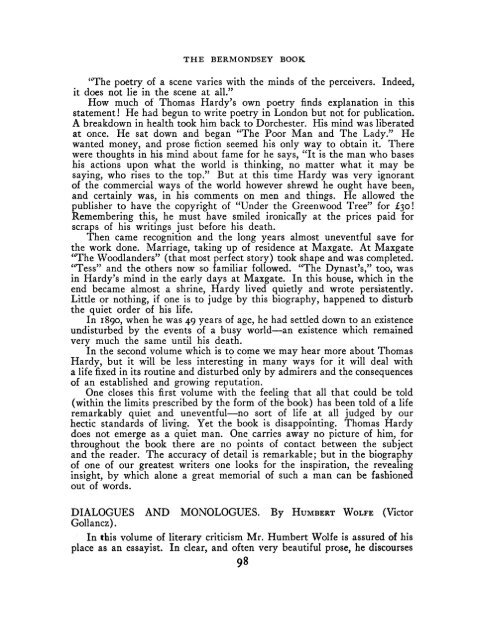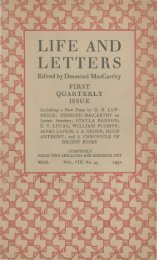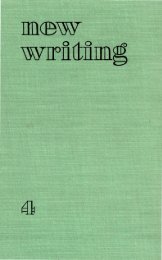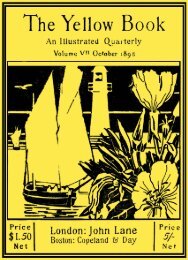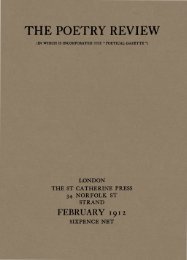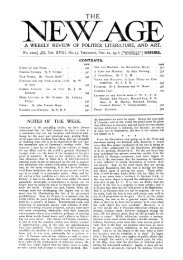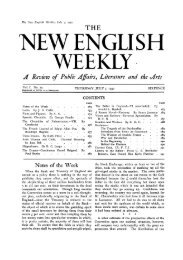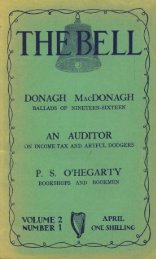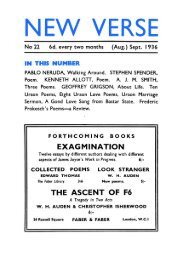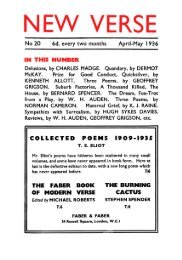Vol. VI No. 1 - Modernist Magazines Project
Vol. VI No. 1 - Modernist Magazines Project
Vol. VI No. 1 - Modernist Magazines Project
You also want an ePaper? Increase the reach of your titles
YUMPU automatically turns print PDFs into web optimized ePapers that Google loves.
THE BERMONDSEY BOOK<br />
"The poetry of a scene varies with the minds of the perceivers. Indeed,<br />
it does not lie in the scene at all."<br />
How much of Thomas Hardy's own poetry finds explanation in this<br />
statement! He had begun to write poetry in London but not for publication.<br />
A breakdown in health took him back to Dorchester. His mind was liberated<br />
at once. He sat down and began "The Poor Man and The Lady." He<br />
wanted money, and prose fiction seemed his only way to obtain it. There<br />
were thoughts in his mind about fame for he says, "It is the man who bases<br />
his actions upon what the world is thinking, no matter what it may be<br />
saying, who rises to the top." But at this time Hardy was very ignorant<br />
of the commercial ways of the world however shrewd he ought have been,<br />
and certainly was, in his comments on men and things. He allowed the<br />
publisher to have the copyright of "Under the Greenwood Tree" for £30!<br />
Remembering this, he must have smiled ironically at the prices paid for<br />
scraps of his writings just before his death.<br />
Then came recognition and the long years almost uneventful save for<br />
the work done. Marriage, taking up of residence at Maxgate. At Maxgate<br />
"The Woodlanders" (that most perfect story) took shape and was completed.<br />
"Tess" and the others now so familiar followed. "The Dynast's," too, was<br />
in Hardy's mind in the early days at Maxgate. In this house, which in the<br />
end became almost a shrine, Hardy lived quietly and wrote persistently.<br />
Little or nothing, if one is to judge by this biography, happened to disturb<br />
the quiet order of his life.<br />
In 1890, when he was 49 years of age, he had settled down to an existence<br />
undisturbed by the events of a busy world—an existence which remained<br />
very much the same until his death.<br />
In the second volume which is to come we may hear more about Thomas<br />
Hardy, but it will be less interesting in many ways for it will deal with<br />
a life fixed in its routine and disturbed only by admirers and the consequences<br />
of an established and growing reputation.<br />
One closes this first volume with the feeling that all that could be told<br />
(within the limits prescribed by the form of the book) has been told of a life<br />
remarkably quiet and uneventful—no sort of life at all judged by our<br />
hectic standards of living. Yet the book is disappointing. Thomas Hardy<br />
does not emerge as a quiet man. One carries away no picture of him, for<br />
throughout the book there are no points of contact between the subject<br />
and the reader. The accuracy of detail is remarkable; but in the biography<br />
of one of our greatest writers one looks for the inspiration, the revealing<br />
insight, by which alone a great memorial of such a man can be fashioned<br />
out of words.<br />
DIALOGUES AND MONOLOGUES. By HUMBERT WOLFE (Victor<br />
Gollancz).<br />
In this volume of literary criticism Mr. Humbert Wolfe is assured of his<br />
place as an essayist. In clear, and often very beautiful prose, he discourses


